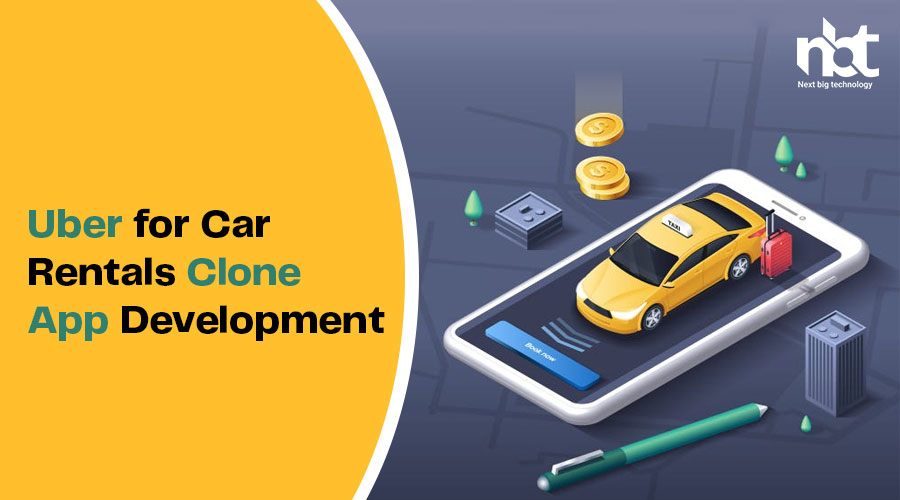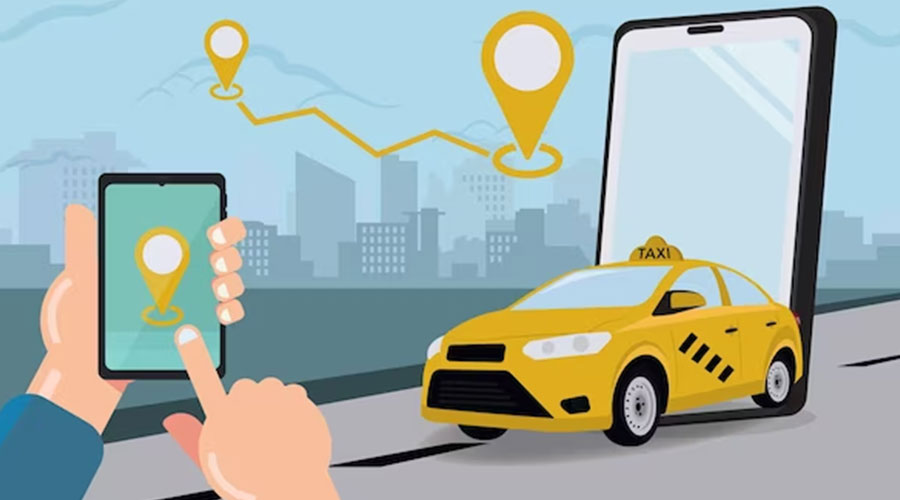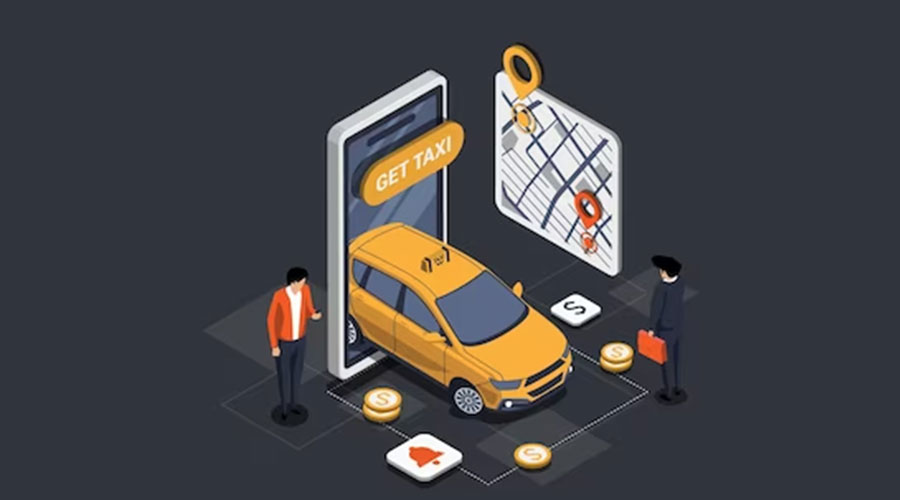Table of Contents
Uber for Car Rentals Clone App Development Services
In recent years, the advent of ride-sharing applications has transformed the transportation landscape, with Uber leading the way. Now, this innovative model is making waves in the car rental industry through the development of Uber-inspired clone apps. These apps are revolutionizing the traditional car rental business, offering a seamless and efficient experience for both customers and car rental businesses.
The Rise of Uber for Car Rentals: The success of Uber has inspired entrepreneurs and businesses to explore similar models in other sectors, including car rentals. The Uber for Car Rentals clone app development services aim to provide a user-friendly platform that connects car owners willing to rent out their vehicles with individuals seeking convenient and affordable transportation.
Key Features of Uber-Inspired Car Rental Apps:
- User-Friendly Interface: The success of any mobile application lies in its ease of use. Uber-inspired car rental apps prioritize a clean and intuitive interface, ensuring that users can effortlessly navigate through the app to find and book the perfect vehicle for their needs.
- Real-Time Booking and Tracking: These apps incorporate real-time booking features, allowing users to quickly reserve a car for their desired time and location. Additionally, GPS tracking ensures that both the renter and owner can monitor the vehicle’s location during the rental period.
- Secure Payment Gateway: A secure and reliable payment gateway is essential for the success of any app facilitating monetary transactions. Uber for car rentals clone apps integrate secure payment options, providing users with a hassle-free payment experience.
- Reviews and Ratings: To build trust within the community, these apps include a review and rating system. Users can share their experiences, and potential renters can make informed decisions based on the feedback of previous users.
- Multi-Language and Currency Support: To cater to a global audience, Uber-inspired car rental apps offer support for multiple languages and currencies, making the platform accessible to a diverse range of users.
Benefits for Car Rental Businesses:
- Increased Visibility: By adopting the Uber model, car rental businesses can significantly increase their visibility and reach a broader audience. The app serves as a powerful marketing tool, attracting new customers and expanding the customer base.
- Streamlined Operations: The automation of booking and payment processes streamlines operations for car rental businesses. This efficiency allows them to focus on providing high-quality service and maintaining their fleet.
- Data Analytics for Growth: Uber-inspired car rental apps come equipped with analytics tools, providing valuable insights into user behavior, preferences, and market trends. This data enables businesses to make informed decisions and implement strategies for sustainable growth.
Create a Uber for Car Rentals Clone App Development in 2023
As we step into 2023, the world of mobile applications continues to evolve, offering new possibilities for entrepreneurs and businesses. One exciting avenue is the development of an Uber for Car Rentals clone app. This comprehensive guide will walk you through the essential steps to create your own innovative car rental platform in 2023.
- Market Research: Understand the Landscape: Before diving into the development process, conduct thorough market research. Identify your target audience, analyze competitors, and pinpoint the unique features that will set your Uber for Car Rentals clone app apart.
- Define Your Unique Selling Proposition (USP): Clearly define what makes your app stand out. Whether it’s a user-friendly interface, exclusive features, or exceptional customer service, a compelling USP will attract users and differentiate your app in a competitive market.
- Choose the Right Technology Stack: Selecting the right technology stack is crucial for the success of your app. Consider factors such as scalability, security, and user experience. Popular choices include React Native or Flutter for cross-platform development, and cloud services for robust backend infrastructure.
- Design an Intuitive User Interface (UI):
Create an intuitive and visually appealing UI. The goal is to provide a seamless and enjoyable experience for users. Implement a clean design, easy navigation, and responsive elements to enhance user engagement.
- Develop Core Features: The success of your Uber for Car Rentals clone app hinges on its features. Key functionalities include:
- User Registration and Authentication
- Real-Time Vehicle Booking
- GPS Tracking
- Secure Payment Gateway
- Reviews and Ratings
- Admin Dashboard for Business Management
- Implement GPS and Map Integration: Integrate GPS and map services to enable real-time tracking of vehicles. This ensures accurate navigation for users and helps car owners keep tabs on their rented vehicles.
- Incorporate a Secure Payment Gateway: Implement a secure and reliable payment gateway to facilitate seamless transactions. Prioritize user data security and offer multiple payment options for user convenience.
- Testing: Ensure a Flawless User Experience: Thoroughly test your app to identify and rectify any bugs or glitches. Conduct user testing to gather feedback on the app’s usability and performance. This iterative process is essential for delivering a polished and reliable product.
- Launch and Marketing Strategy: Plan a strategic launch for your Uber for Car Rentals clone app. Utilize digital marketing channels, social media, and partnerships to create awareness and attract users. Consider offering promotions or discounts during the initial launch phase to generate buzz.
- Continuous Improvement and Updates: After the launch, monitor user feedback and performance metrics. Regularly update your app to introduce new features, improve functionality, and address any issues. Staying agile and responsive to user needs is key to long-term success.
Why Should You Go for Uber for Car Rentals Clone App Development in 2023?
In the dynamic landscape of the transportation industry, innovation is the key to staying ahead of the curve. As we step into 2023, the Uber for car rentals clone app development is emerging as a game-changer, offering a host of benefits for both entrepreneurs and users. Let’s explore why diving into this trend is a strategic move this year.
- Tapping into a Proven Model: Uber has revolutionized the way we think about transportation. By opting for Uber-inspired car rental app development, you are leveraging a proven and successful business model. The familiarity users have with the Uber interface and functionality can translate into quicker user adoption and trust in your car rental platform.
- Meeting the Growing Demand for Convenience: The modern consumer values convenience, and the car rental industry is no exception. Uber for car rentals clone apps simplifies the entire rental process, from booking to payment, making it an attractive option for individuals seeking hassle-free and on-demand transportation solutions. As the demand for convenience continues to rise, aligning your business with this trend positions you for success.
- Expanding Your Customer Base: The Uber-inspired model extends the reach of your car rental business beyond traditional boundaries. With a user-friendly app, you can attract a diverse audience, including tech-savvy individuals and those looking for a seamless rental experience. This expansion of your customer base can lead to increased bookings and revenue.
- Enhanced Operational Efficiency: Efficiency is at the core of Uber for car rentals clone apps. These platforms automate various aspects of the rental process, including booking, payment, and vehicle tracking. By streamlining operations, your business can operate more smoothly, reducing manual workload and allowing you to focus on providing excellent service to your customers.
- Competitive Edge in a Changing Market: The transportation industry is evolving rapidly, and staying competitive requires embracing technological advancements. Developing an Uber-inspired car rental app not only meets the current expectations of users but also positions your business as an industry leader. This competitive edge can be a key differentiator in a market where innovation is driving success.
Market Prospects of Uber for Car Rentals Clone App Developmen and Platforms
In the dynamic landscape of the transportation industry, the emergence of Uber for car rentals clone app development and platforms has sparked a significant paradigm shift. This innovative approach, inspired by the success of ride-sharing giants like Uber, is now making waves in the car rental sector. As technology continues to reshape traditional business models, the market prospects for Uber-inspired car rental platforms are gaining momentum.
The Current State of the Car Rental Industry:
The car rental industry has traditionally been characterized by brick-and-mortar rental agencies and a somewhat cumbersome reservation process. However, the advent of Uber-inspired clone apps has injected a breath of fresh air into this sector. These platforms leverage the ubiquity of smartphones and the convenience of app-based services, offering users a seamless and efficient way to rent vehicles on-the-go.
Key Market Prospects:
- Rising Demand for On-Demand Services: The on-demand economy is thriving, with consumers increasingly seeking services that are available at their fingertips. Uber for car rentals clone apps capitalizes on this trend, providing a user-friendly interface for individuals looking for convenient and instant access to rental vehicles.
- Enhanced User Experience: User experience is paramount in the success of any app, and Uber-inspired car rental platforms excel in this aspect. The streamlined booking process, real-time tracking, and secure payment gateways contribute to an enhanced and hassle-free experience for both renters and car owners.
- Global Expansion Opportunities: The success of Uber has proven the scalability of the ride-sharing model on a global scale. Similarly, Uber for car rentals clone platforms opens up opportunities for expansion into diverse markets. With multi-language and currency support, these platforms can cater to a global audience, tapping into the growing demand for flexible transportation solutions.
- Technological Advancements: The continuous evolution of technology presents exciting prospects for Uber-inspired car rental platforms. Integration with cutting-edge technologies such as artificial intelligence and machine learning can further enhance user experiences, optimize fleet management, and improve overall operational efficiency.
- Market Disruption and Competitor Response: The entry of Uber for car rentals clone platforms disrupts the traditional car rental market. Established rental agencies are increasingly recognizing the need to adapt to changing consumer preferences. This shift has prompted both established players and new entrants to invest in app-based solutions to stay competitive.
Essential Features of a Uber for Car Rentals Clone App Developmen
In the dynamic realm of transportation, the emergence of Uber has not only revolutionized ride-sharing but has also sparked innovation in the car rental sector. Entrepreneurs and businesses are increasingly turning to Uber for Car Rentals clone app development services to capitalize on this transformative model. To ensure the success of such applications, several essential features must be integrated, creating a seamless and user-centric experience for both car owners and renters.
- User-Friendly Interface: At the core of any successful app is an intuitive and user-friendly interface. The Uber for Car Rentals clone app should prioritize simplicity in design, ensuring that users, whether car owners or renters, can easily navigate through the app. This enhances the overall user experience and encourages continued engagement.
- Real-Time Booking and Tracking: The cornerstone of on-demand services lies in real-time functionalities. Enabling users to book a vehicle instantly and track its location in real time enhances the efficiency and convenience of the app. This feature ensures quick reservations and provides a sense of security for both parties involved in the transaction.
- Secure Payment Gateway: Security is paramount in any app facilitating financial transactions. An Uber-inspired car rental app must integrate a secure and reliable payment gateway to safeguard user information and ensure smooth transactions. Multiple payment options should be supported to cater to diverse user preferences.
- Reviews and Ratings System: Building trust within the community is vital for the success of a car rental platform. Implementing a robust reviews and ratings system allows users to share their experiences and provides valuable feedback for both car owners and renters. Positive reviews contribute to the credibility of the platform.
- Multi-Language and Currency Support: To cater to a diverse user base, the app should support multiple languages and currencies. This inclusivity not only broadens the app’s accessibility but also enhances the user experience for individuals from different regions and backgrounds.
- Instant Notifications: Keeping users informed is crucial for a successful car rental app. Implementing instant notification features for booking confirmations, payment receipts, and other relevant updates ensures that users stay well-informed throughout the entire rental process.
- Document Verification and Validation: To ensure the authenticity of users and vehicles, the app should incorporate a robust document verification and validation system. This includes verifying driver’s licenses, vehicle registration, and other necessary documents, enhancing the overall safety and reliability of the platform.
- Responsive Customer Support: A responsive and efficient customer support system is indispensable. Users should have access to assistance whenever needed, be it for troubleshooting, dispute resolution, or general inquiries. This contributes to a positive user experience and builds trust in the platform.
In the ever-evolving landscape of the transportation industry, the integration of advanced features is taking Uber for Car Rentals clone app development to new heights. As technology continues to shape the way we travel, these cutting-edge applications are not just mimicking the success of Uber but surpassing it with innovative functionalities. Let’s delve into the advanced features that are reshaping the car rental experience.
Advanced Features Uber for Car Rentals Clone App Development
- AI-Powered Predictive Analytics: One of the standout features in advanced Uber for Car Rentals clone apps is the integration of Artificial Intelligence (AI) and predictive analytics. These systems analyze user behavior, historical data, and market trends to predict demand, allowing car rental businesses to optimize their fleets, pricing, and availability.
- Blockchain for Secure Transactions: Security is paramount in any financial transaction. Advanced car rental apps leverage blockchain technology to enhance the security of transactions. The decentralized and tamper-resistant nature of blockchain ensures that payment information remains secure, fostering trust between users and the platform.
- Augmented Reality (AR) Navigation: To provide a seamless and user-friendly experience, some Uber-inspired car rental apps incorporate augmented reality (AR) navigation. This feature assists users in locating their rental vehicles with precision, reducing the time spent searching for the car and enhancing overall convenience.
- Dynamic Pricing Algorithms: Advanced pricing algorithms go beyond fixed rates, adapting to real-time factors such as demand, weather conditions, and events in the area. This dynamic pricing model ensures fairness and competitiveness while allowing car rental businesses to optimize revenue.
- Voice Recognition and Commands: The integration of voice recognition technology enables users to interact with the app using natural language. This hands-free approach enhances safety and convenience, allowing users to book, navigate, and manage their rentals with voice commands.
- IoT Connectivity for Vehicle Monitoring: Internet of Things (IoT) connectivity is a game-changer in advanced car rental apps. Sensors and devices within the rental vehicles provide real-time data on fuel levels, maintenance needs, and even driver behavior. This ensures the fleet’s optimal performance and allows for proactive maintenance.
- Biometric Authentication: To bolster security measures, some Uber for Car Rentals clone apps incorporate biometric authentication. Users can register and access the app using fingerprint or facial recognition, adding an extra layer of protection to their accounts and transactions.
- Personalized User Experience: Advanced apps focus on delivering a personalized user experience. By analyzing user preferences, past rental history, and behavior, the app can recommend suitable vehicles, offer personalized promotions, and enhance overall customer satisfaction.
Uber for Car Rentals Clone App Development Timelines
In the fast-paced world of technology, the development of an Uber for Car Rentals clone app is an exciting venture for businesses looking to tap into the flourishing car rental market. Understanding the timelines involved in this process is crucial for a successful and timely launch. In this article, we’ll delve into the stages of development and the approximate timelines associated with creating a robust and efficient Uber-inspired car rental app.
- Initial Planning and Research (2-4 Weeks): The journey begins with a comprehensive planning phase. During this stage, the development team, along with stakeholders, outlines the app’s features, functionalities, and target audience. Market research is conducted to identify key competitors and market trends. A well-structured plan at this stage sets the foundation for the entire development process.
- Design and Prototyping (4-6 Weeks): Once the planning phase is complete, the focus shifts to the design and prototyping of the app. User experience (UX) and user interface (UI) designers collaborate to create a visually appealing and user-friendly interface. The prototype undergoes multiple iterations based on feedback, ensuring a seamless and intuitive design that aligns with user expectations.
- Development (12-16 Weeks): The development phase is the backbone of the entire process. Skilled developers bring the design to life, incorporating the planned features and functionalities. This stage involves coding, database setup, and integration of third-party services. Regular testing is crucial during development to identify and address any bugs or issues promptly.
- Testing and Quality Assurance (4-6 Weeks): Rigorous testing is conducted to ensure the app functions flawlessly across various devices and platforms. This phase involves both manual and automated testing to identify and rectify any inconsistencies or performance issues. Quality assurance ensures the app meets industry standards and provides a seamless user experience.
- Deployment (2-4 Weeks): With thorough testing completed, the app is ready for deployment. The deployment phase involves launching the app on the chosen platforms (iOS, Android) and ensuring it complies with the respective app store guidelines. This stage also includes the implementation of any backend systems and server configurations.
- Post-Launch Support and Updates (Ongoing): The journey doesn’t end with the app’s launch. Continuous support and updates are essential to address user feedback, fix any post-launch issues, and implement new features or improvements. Regular updates ensure the app stays competitive in the dynamic market.
How Much Does It Cost to Build a Uber for Car Rentals Clone App Development?
In the era of digital disruption, entrepreneurs and businesses are continually seeking innovative solutions to tap into the evolving transportation landscape. The concept of creating an Uber-inspired car rental app has gained significant traction, promising a lucrative venture. However, the burning question on every prospective investor’s mind is: How much does it cost to build a Uber for car rentals clone app? Let’s delve into the factors that influence the development cost and shed light on the investment involved in bringing this revolutionary app to life.
- App Development Platform: The choice of the app development platform plays a pivotal role in determining the overall cost. Whether you opt for iOS, Android, or a cross-platform solution, each platform comes with its own set of development complexities and costs. Cross-platform solutions might seem cost-effective initially, but the unique features of each platform may demand additional customization.
- Features and Functionality: The robustness and sophistication of features embedded in your Uber for car rentals clone app significantly impact the development cost. Basic features include user registration, real-time booking, secure payment gateways, GPS tracking, and reviews/ratings. Advanced features like multilingual support, integration with third-party services, and data analytics tools contribute to a higher overall cost.
- User Interface (UI) and User Experience (UX) Design: The visual appeal and usability of your app are crucial for attracting and retaining users. Investing in a well-designed UI/UX enhances user satisfaction, but it also incurs additional design and development costs. A seamless and intuitive interface contributes to the overall success of the app.
- Security Measures: Given the sensitive nature of financial transactions and personal data involved in a car rental app, robust security measures are non-negotiable. Implementing advanced security protocols adds an extra layer of protection but may increase development costs.
- Geographical Location of Development Team: The location of the development team is a significant factor influencing costs. Development teams in regions with higher living costs generally charge more for their services. Consideration should be given to the balance between cost and quality to ensure a successful development process.
- Testing and Quality Assurance: Thorough testing is essential to identify and rectify any bugs or issues in the app. Investing in a comprehensive testing and quality assurance process adds to the overall development cost but ensures a smoother and error-free user experience.
- Post-Launch Support and Maintenance: The journey doesn’t end with the app’s launch. Post-launch support, updates, and maintenance are ongoing necessities. Allocating resources for continuous improvement and customer support is an integral part of the overall cost of running a successful Uber for car rentals clone app.
How to Create a Uber for Car Rentals Clone App Development – Team and Tech Stack
The evolution of the transportation industry has seen a surge in on-demand services, with Uber leading the way. For entrepreneurs looking to capitalize on this trend, developing a Uber for car rentals clone app is an enticing venture. In this article, we’ll explore the crucial aspects of assembling the right team and selecting the appropriate technology stack to ensure the success of your car rental app.
Team Composition:
- Project Manager: A seasoned project manager is essential to oversee the entire development process. They will be responsible for coordinating efforts, setting timelines, and ensuring that the project aligns with the business goals.
- UI/UX Designers: User experience is a critical factor in the success of any app. UI/UX designers will craft an intuitive and visually appealing interface, ensuring a seamless and enjoyable experience for users.
- Developers: Backend and frontend developers are the backbone of your development team. Backend developers will handle server-side logic, database management, and API integration, while frontend developers will bring the user interface to life.
- Mobile App Developers: Given the mobile-centric nature of on-demand apps, having skilled mobile app developers (iOS and Android) is crucial. They will be responsible for creating the app’s functionality and ensuring a smooth user experience on both platforms.
- Quality Assurance (QA) Team: A dedicated QA team is vital to identify and rectify any bugs or glitches in the app. Thorough testing is essential to deliver a polished and reliable product to users.
Tech Stack:
- Backend Development:
- Language: Choose a language that suits your development team’s expertise, such as Node.js, Python, or Ruby.
- Framework: Utilize a framework like Express (Node.js), Django (Python), or Ruby on Rails (Ruby) for efficient backend development.
- Database Management:
- Select a robust and scalable database system such as MySQL, PostgreSQL, or MongoDB to handle data storage and retrieval.
- Frontend Development:
- Opt for popular frontend frameworks like React or Angular to build responsive and dynamic user interfaces.
- Mobile App Development:
- For cross-platform development, consider frameworks like React Native or Flutter. Alternatively, native development using Swift (iOS) and Kotlin/Java (Android) offers a more platform-specific experience.
- Cloud Services:
- Leverage cloud services like AWS, Google Cloud, or Microsoft Azure for scalable infrastructure, data storage, and hosting.
- Payment Integration:
- Integrate secure and widely used payment gateways such as Stripe, PayPal, or Braintree to facilitate seamless transactions.
- Geolocation Services:
- Implement geolocation services like Google Maps API to enable real-time tracking and location-based features.
Uber for Car Rentals Clone App Development Process
In the ever-evolving landscape of transportation, the concept of “Uber for Car Rentals” has gained significant traction. Entrepreneurs and businesses are now looking to capitalize on this trend by exploring the development of clone apps that replicate the success of Uber in the car rental industry. This article takes a closer look at the intricacies of the Uber for Car Rentals clone app development process.
Understanding the Concept: Before delving into the development process, it’s crucial to grasp the fundamentals of the Uber for Car Rentals model. This innovative approach connects car owners willing to rent out their vehicles with individuals seeking convenient and affordable transportation, all facilitated through a user-friendly mobile application.
The Development Process:
- Market Research and Analysis: The journey begins with a comprehensive market research and analysis phase. Developers need to understand the dynamics of the car rental industry, identify target audiences, and assess the competitive landscape. This step lays the foundation for a successful development strategy.
- Defining Features and Functionality: Based on the insights gained from market research, developers outline the key features and functionality of the app. These may include real-time booking, secure payment gateways, GPS tracking, user reviews, and language/currency support. The goal is to create a seamless and user-centric experience.
- Technology Stack Selection: Choosing the right technology stack is critical for the performance and scalability of the app. Developers decide on the programming language, database, and frameworks that align with the project requirements. This step ensures a robust and efficient application.
- User Interface (UI) and User Experience (UX) Design: The success of any app hinges on its design. UI/UX designers create an intuitive and visually appealing interface that enhances user engagement. The design phase focuses on creating a seamless flow for users, making the app easy to navigate.
- Prototyping and Wireframing: Before diving into full-scale development, creating prototypes and wireframes helps visualize the app’s structure and functionality. This step allows for feedback and adjustments, ensuring that the final product meets user expectations.
- Development and Testing: The actual development phase involves coding and programming the app. Simultaneously, rigorous testing is conducted to identify and address any bugs or glitches. This iterative process continues until the app meets the highest standards of quality and reliability.
- Deployment: Once development and testing are complete, the app is ready for deployment. It is released to the intended app stores, making it accessible to users. This phase requires coordination and attention to detail to ensure a smooth launch.
- Post-Launch Support and Updates: The journey doesn’t end with deployment. Continuous support and updates are crucial to address user feedback, fix any emerging issues, and introduce new features. Regular updates keep the app relevant and competitive in the dynamic market.
Next Big Technology – Your Trusted Uber for Car Rentals Clone App Development Partner
In an era where convenience and efficiency dominate the digital landscape, the concept of Uber for car rentals has taken the transportation industry by storm. As businesses seek innovative solutions to meet the evolving needs of consumers, finding a reliable app development partner becomes paramount. Enter Next Big Technology, your trusted ally in crafting cutting-edge Uber-inspired clone apps for the car rental industry.
The Evolution of Car Rentals:
Traditional car rental processes are being reshaped by technology, and the Uber-inspired model has emerged as a game-changer. With a focus on user-friendly interfaces, real-time interactions, and seamless transactions, these apps have redefined the way people access transportation services.
Why Next Big Technology?
- Expertise in Clone App Development: Next Big Technology stands out as a leader in clone app development, leveraging its expertise to create tailor-made solutions for the car rental sector. The team’s proficiency in replicating the successful Uber model ensures that your app will meet industry standards and user expectations.
- Innovative Features for Seamless Experiences: Crafting a successful Uber for car rentals clone app involves incorporating innovative features that enhance the user experience. Next Big Technology goes beyond the basics, integrating real-time booking, secure payment gateways, and intuitive interfaces to create an app that stands out in the market.
- Customization to Reflect Your Brand: Recognizing the uniqueness of each business, Next Big Technology offers a high level of customization. Your app will not only meet industry standards but will also reflect the specific identity and brand values of your car rental business.
- Responsive Customer Support: Next Big Technology is committed to providing excellent customer support throughout the development process and beyond. The team understands the importance of a reliable partner, ensuring that you have assistance whenever needed.
- SEO Optimized Solutions for Visibility: In the digital age, visibility is crucial for success. Next Big Technology integrates SEO strategies into the app development process, enhancing its online presence and ensuring that your Uber for car rentals clone app is easily discoverable by potential users.
- Cost-Effective Solutions: Understanding the budget constraints of businesses, Next Big Technology offers cost-effective solutions without compromising on quality. This ensures that even small and medium-sized enterprises can benefit from cutting-edge app development services.
Enterprise Uber for Car Rentals Clone App Development
In the ever-evolving landscape of corporate travel, businesses are continually seeking innovative solutions to streamline their transportation needs. The emergence of Enterprise Uber for Car Rentals clone app development services is revolutionizing the way companies manage their fleets and provide convenient, efficient transportation for employees. This article delves into the key aspects of these solutions, exploring their features, benefits, and the impact they have on enterprise mobility.
Understanding Enterprise Uber for Car Rentals Clone Apps:
Enterprise Uber for Car Rentals clone apps cater specifically to the unique requirements of businesses looking to optimize their transportation operations. These apps are designed to offer a seamless platform for corporate clients to manage and deploy rental vehicles for their employees, ensuring a smooth and efficient travel experience.
Key Features for Enterprise Use:
- Corporate Account Management: These apps provide businesses with a centralized platform to manage their corporate accounts. This feature allows for easy monitoring of expenses, travel patterns, and overall fleet utilization.
- Customized Access Levels: To maintain control and security, Enterprise Uber for Car Rentals clone apps offer customizable access levels. This ensures that only authorized personnel can manage and book vehicles, adding an extra layer of security for corporate accounts.
- Expense Tracking and Reporting: Businesses benefit from integrated expense tracking and reporting tools. This feature simplifies financial management by providing detailed insights into travel expenditures, helping companies make informed decisions regarding their transportation budget.
- Fleet Management Tools: These apps include robust fleet management tools, allowing businesses to monitor the condition and usage of their vehicles in real-time. From scheduling maintenance to optimizing routes, these tools enhance the overall efficiency of corporate fleets.
- Multi-Location Support: Enterprises with a global presence can leverage the multi-location support offered by these apps. This ensures a consistent and standardized transportation experience for employees across various regions.
Benefits for Enterprises:
- Cost-Efficiency: Adopting Enterprise Uber for Car Rentals clone apps can lead to significant cost savings for businesses. By optimizing fleet usage, reducing idle time, and implementing data-driven decisions, enterprises can achieve a more cost-efficient transportation model.
- Increased Productivity: Streamlined processes and real-time monitoring contribute to increased productivity. Employees can focus on their tasks without worrying about transportation logistics, leading to enhanced efficiency and overall job satisfaction.
- Environmental Sustainability: Optimized route planning and efficient fleet management contribute to a reduction in carbon emissions. This aligns with the growing corporate emphasis on sustainability and environmental responsibility.
- Enhanced Employee Experience: Providing employees with a user-friendly, reliable transportation solution enhances their overall experience. This, in turn, contributes to employee satisfaction and retention.
Top Uber for Car Rentals Clone App Development Companies
In the ever-evolving landscape of the transportation industry, the emergence of Uber-inspired car rental clone apps has become a game-changer. As the demand for efficient and convenient car rental solutions grows, numerous development companies have risen to the occasion. In this article, we explore the top Uber for car rentals clone app development companies that have been at the forefront of revolutionizing the way we rent vehicles.
-
-
Next Big Technology:
Next Big Technology is one of the top development companies for the high-quality development of mobile apps and web development services. They have having experienced in-house team of developers who provide top-notch development services according to the business requirements. NBT provides highly business-oriented services and implements all the latest and trending tools and technologies. They always work hard to deliver a top-notch solution at an affordable cost. They are having experience of more than 13 years and delivered lots of projects around the globe to businesses and clients.
NBT is highly focused on providing top-notch development solutions at a very affordable cost. By using their market experience and development experience, they are delivering proper solutions to clients and various industries for their custom requirements.
Location: India, USA, UK, Australia
Hourly Rate :< $25 per Hour
Employees: 50 – 249
Focus Area
- Mobile App Development
- App Designing (UI/UX)
- Software Development
- Web Development
- AR & VR Development
- Big Data & BI
- Cloud Computing Services
- DevOps
- E-commerce Development
Industries Focus
- Art, Entertainment & Music
- Business Services
- Consumer Products
- Designing
- Education
- Financial & Payments
- Gaming
- Government
- Healthcare & Medical
- Hospitality
- Information Technology
- Legal & Compliance
- Manufacturing
- Media
-
- Codiant Software Technologies: Codiant Software Technologies has earned its place among the top Uber for car rentals clone app development companies. Renowned for its commitment to delivering cutting-edge solutions, Codiant has consistently provided robust and feature-rich apps that cater to the unique needs of the car rental industry.
- Mindster: Specializing in on-demand app development, Mindster has made significant strides in the realm of Uber-inspired car rental apps. The company’s proficiency in creating user-friendly interfaces and incorporating advanced features has positioned it as a go-to choice for businesses seeking top-notch app development services.
- Space-O Technologies: Space-O Technologies has established itself as a prominent player in the field of app development, including Uber for car rentals clone apps. The company’s commitment to delivering cost-effective, scalable, and customizable solutions has garnered acclaim from clients worldwide.
- Cubix: Cubix has earned a reputation for its expertise in creating tailored solutions for various industries, including transportation. The company’s proficiency in developing Uber-inspired car rental apps has placed it among the top contenders in the market, offering clients reliable and feature-rich applications.
FAQs on Uber for Car Rentals Clone App Development
As the car rental industry undergoes a digital transformation, the concept of Uber-inspired clone apps is gaining momentum. Entrepreneurs and businesses are eager to understand the ins and outs of Uber for car rentals clone app development. In this article, we delve into the frequently asked questions (FAQs) surrounding the development of these innovative platforms.
- What is an Uber for Car Rentals Clone App? An Uber for Car Rentals clone app is a customized application inspired by the success of ride-sharing giants like Uber. It connects vehicle owners willing to rent out their cars with individuals seeking convenient and on-demand transportation.
- How Does the App Work? The app functions on a straightforward principle. Car owners register their vehicles on the platform, specifying rental terms and conditions. Users, on the other hand, can browse available vehicles, book them for a specified duration, and make secure online payments. The app streamlines the entire process, from booking to payment and vehicle return.
- What Features Are Essential for a Car Rental Clone App? A successful Uber for car rentals clone app should include features such as a user-friendly interface, real-time booking and tracking, secure payment gateways, reviews and ratings, and multi-language and currency support. These elements collectively contribute to a seamless user experience.
- How Can Businesses Benefit from Developing a Car Rental Clone App? Businesses in the car rental industry can reap numerous benefits from adopting a clone app model. These include increased visibility, streamlined operations, and valuable data analytics insights. The app serves as a powerful tool to attract new customers, enhance service quality, and make informed business decisions.
- Is Customization Possible for Unique Business Models? Absolutely! Uber for car rentals clone app development services offer customization options to tailor the platform to the unique needs of each business. From branding and design to functionality, businesses can mold the app to align with their specific goals and objectives.
- How Secure Are Transactions on the App? Security is a top priority in Uber for car rentals clone apps. These platforms integrate secure payment gateways to ensure that transactions are protected. Users can confidently make online payments without worrying about the safety of their financial information.
- Is Technical Support Available During and After Development? Reputable app development services provide technical support throughout the development process and beyond. This ensures that any technical issues are promptly addressed, and updates or improvements can be implemented to enhance the app’s performance.
- What’s the Timeframe for Developing a Car Rental Clone App? The development timeframe varies based on factors such as features, complexity, and customization requirements. On average, it can take several weeks to a few months to create a fully functional and customized Uber for car rentals clone app.
Thanks for reading our post “Uber for Car Rentals Clone App Development”. Please connect with us to learn more about the Uber for Car Rentals.
























